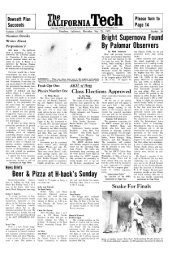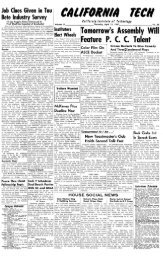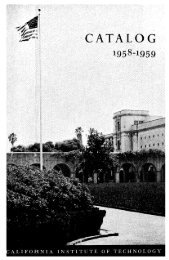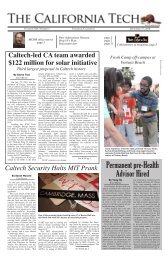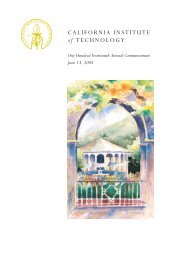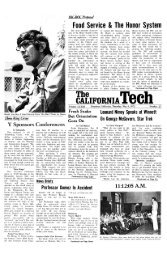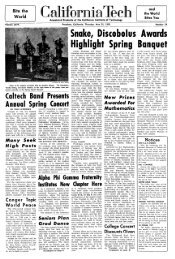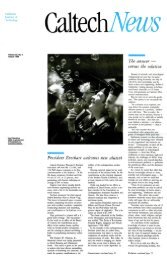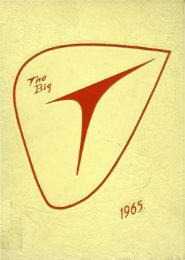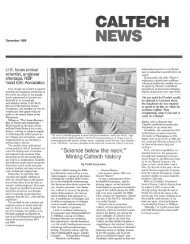PDF (1941) - CaltechCampusPubs
PDF (1941) - CaltechCampusPubs
PDF (1941) - CaltechCampusPubs
Create successful ePaper yourself
Turn your PDF publications into a flip-book with our unique Google optimized e-Paper software.
BIOLOGY 197<br />
Bi. 117. Quantitative Organic Microanalysi •• 20 units (0-20-0); .econd<br />
term.<br />
Laboratory practice in the methods of quantitative organic microanalysi. required<br />
for structure determinations of organic compounds. Students must obtain permission<br />
from the instructor before registering for this subject as the enrollment is necessarily<br />
limited.<br />
Instructor: Haagen-Smit.<br />
Bi. 120. Experimental Embryology. 6 units (1-0-5).<br />
Lectures and discussion of the problems of embryonic development, including<br />
luch topics as growth of the ovary, breeding habits of animals, fertilization, cleavage,<br />
organ formation, metamorphosis, regeneration, tissue culture, embryonic metabolism,<br />
etc.<br />
The subject may be taken for two consecutive years since the subject matter<br />
will be duplicated only in alternate years.<br />
Instructor: Tyler.<br />
Bi. 121 a, b, c. Experimental Embryology Laboratory. Units to be decided<br />
by student and instructor; given any term.<br />
The work will include certain classical experiments and instruction in the<br />
methods of studying embryonic metabolism, in transplantation, vital staining, etc.<br />
Instructor: Tyler.<br />
Bi. 125 a, b, c. Graduate Genetics. 12 units (2-3-7).<br />
In the first term a systematic survey of the field will be presented. In the second<br />
and third terms special subjects will be treated in more detail. The material in the<br />
second and third terms will not ordinarily be duplicated in a period of three years,<br />
and students majoring in Genetics will be expected to register for six terms. The<br />
laboratory work will consist of individual problems.<br />
Instructors: Sturtevant, Anderson, S. Emerson.<br />
Bi. 13 o. Biological Problems.<br />
A course of lectures and reading, including such general topics II life cycles of<br />
protozoa and insects, secondary sexual characters and hormones; parthenogenesa.<br />
regeneration and grafting; the nature of biological theories. etc.<br />
Instructor: Morgan.<br />
Bi. 140 a, b, c. Plant Physiology. 6 units (2-0-4); first •• econd and third<br />
terms.<br />
Reading and discussion of the main problems of plant phy.iology.<br />
Instructors: Went, Bonner. van Overbeek.<br />
Bi. 141. Plant Chemistry. 6 units (0-3-3); first, second and third terms.<br />
Laboratory subject in the analysis of plant materials by macro- and microchemical<br />
methods.<br />
Instructor: Bonner.<br />
Bi. 160. Advanced Physiology. 12 units (0-8-4); first and second terms.<br />
A subject in the methods of physiology, with special reference to nerve and<br />
muscle, with opportunity for research.<br />
Instructors: Wiersma, van Harreveld.<br />
Bi. 170. Research.<br />
In special cases, not included in the preceding announcement,. .tudents doing<br />
advanced work in the department may register under this heading and receive a<br />
.tated amount of credit. Students should consult with the instructor in charge of<br />
their major work before registering for this subject.




